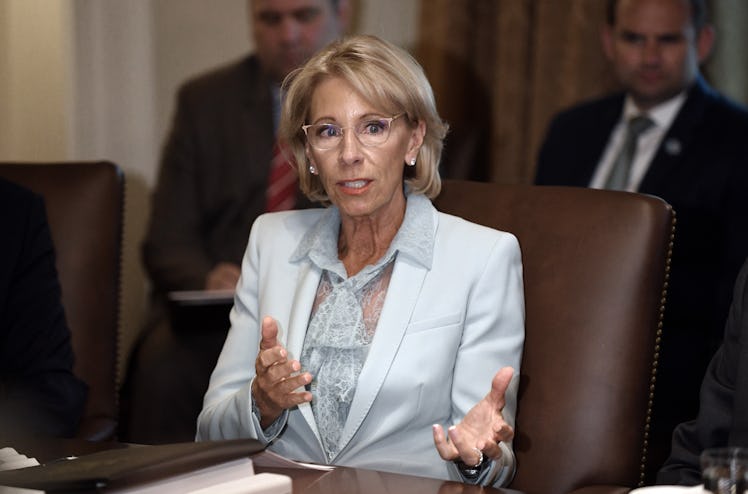
This Is How Betsy Devos' New Title IX Rules Could Affect Students
On Friday, Nov. 16, Betsy DeVos released a long-awaited proposal to scale back policies on campus sexual assaults that were enforced by President Barack Obama, and it's arguably worse than people thought. So, how will Betsy DeVos' new campus assault proposal affect students? The drastic changes could have some serious effects.
Although DeVos claims the proposal will fix a "failed" and "shameful" system that she says has been unfair to accused students, per NPR, it narrows the type of cases schools can investigate, thus offering less protections for victims and more for those accused of wrongdoing. Elite Daily reached out to the Department of Education (DOE) for further clarification of DeVos' comments about the current Title IX system, but did not hear back at the time of publication.
After more than a year in the making, DeVos announced the proposal on Friday afternoon. Under the plan — which would also replace Obama-era policies on how to implement Title IX, the law that prohibits gender discrimination, including sexual assault, on college campuses — schools would only be required to investigate allegations if they occurred on campus grounds. Additionally, complaints are only taken into account when they are reported to certain school officials. The DOE Secretary DeVos shared a statement with NBC News saying that the proposal is to help ensure that each person involved in a complaint is treated fairly. The statement read:
Throughout this process, my focus was, is, and always will be on ensuring that every student can learn in a safe and nurturing environment. That starts with having clear policies and fair processes that every student can rely on. Every survivor of sexual violence must be taken seriously, and every student accused of sexual misconduct must know that guilt is not predetermined.
Elite Daily reached out to the DOE for further clarification of the new proposed rules, but did not hear back at the time of publication.
Others, however, disagree with DeVos' plan. The proposal caught backlash almost immediately, from the ACLU to congressional leaders. Elite Daily spoke with Alyssa Peterson, state organizer of Know Your IX, a survivor and youth-led project of Advocates for Youth that works to help students to end sexual and dating violence in their schools, who offered up further introspection on why the proposal is so problematic for students. "[This isn't] valuing the threat of the survivor to lose her education as much as it values the right of the perpetrator to continue to access his education."
One major change is that a person accused would be able to cross-examine their accuser through an intermediary, like an adviser or an attorney, which was "discouraged" with the Obama-era guidelines, per The Washington Post. Peterson fears implementing cross-examination. "We are concerned that it could deter people from coming forward because they could face really damaging questions, [maybe] blaming them for their assault," she explained. Instead, Peterson says, a reasonable option would be written questions, which allow investigators to get sufficient information and test credibility without traumatizing the survivor.
Another big change is how campuses define sexual harassment. Per ABC News, Obama's plan defined it as "unwelcome conduct of a sexual nature." DeVos' proposal, however, narrows that scope, defining it as unwanted sexual conduct that is "so severe, pervasive and objectively offensive that it denies a recipient's education program or activity." Cropping out students who weren't egregiously assaulted, Peterson says, is unfair and could leave them with nowhere to turn. "It increases the likelihood that the survivor will need to drop out [to avoid running into their accuser]," she says. Elite Daily reached out to the DOE for comment on how the proposed definition change could affect student reporting, but did not hear back at the time of publication.
She also points out that the proposal would essentially let schools off the hook for assaults. "It's really about cutting costs for schools," she says. "The goal is to have schools investigate fewer cases." But at what cost? Citing the struggles colleges already face in investigating sexual assaults, Peterson adds, "We know that one-in-five women are sexually assaulted, and the fact that they would further reduce investigations is disturbing and heinous."
The good news is, the policy isn't in effect just yet. The rule first has to be published, which Peterson expects some time next week, and then there's a 60-day period where the public can express comments on the matter. Peterson recommends going to Know Your IX's website, where you can easily submit your comments. Or, gather up some friends and have a comment party where you write comments to the DOE about the rule. "We just want things to be equal," she pleads.